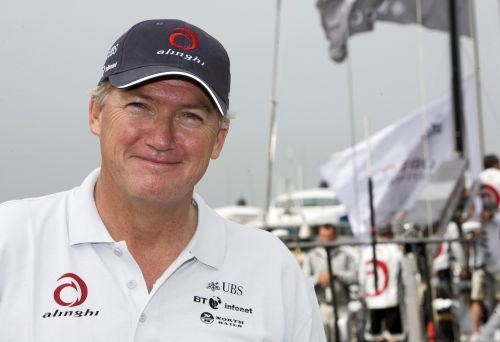Alinghi Coach Gilmour talks about 2007 and beyond
by Diane Swintal on 14 Feb 2007

Peter Gilmour Ivo Rovira /Alinghi
Match Racing champion Peter Gilmour minces no words. He is a veteran of five America's Cup campaigns. His prolific use of the protest flag while at the helm of Kookaburra, the 1987 America's Cup defender, prompted the writing of a separate set of Match Racing Rules.
Alinghi have appointed the 2006 World Match Racing Champion Gilmour as coach to bring a new perspective to the team just four months ahead of their defence in Valencia.
Just before his Alinghi appointment he showed he had some definite ideas of who's got it right and who might have it wrong as the 32nd America's Cup approaches.
As sailing director and skipper for OneWorld in 2000, Gilmour came to the decision he feels many teams have to make - does one man run the entire show, or does he split duties so he can focus his entire concentration in one area, be it the sailing team or team management? Gilmour stepped away from the wheel of OneWorld just days ahead of the Louis Vuitton Cup, making Australian phenomenon James Spithill the team's helmsman, and he believes that is the best plan of action.
'I believe it is extremely difficult for somebody to be in a position of running a campaign, making the design decisions and trying to skipper the boat,' says Gilmour.
'Yes, the Cup has been built on a foundation of charismatic leaders, but it's become so similar to something like Formula One racing, where it is too great a responsibility to put onto one person. That became obvious to me during the OneWorld campaign, when I put James Spithill in charge to run the sailing for me.
'When you examine the psychology of the teams, it seems to me that probably Alinghi is doing the best job at the moment of insulating the skippers away from that role of management,' hypothesizes Gilmour.
'The other campaign I look at is Oracle, where Chris Dickson is doing it all from what I can see. Knowing what you go through and knowing what you experience, it's going to be very difficult if he can’t pull himself out of that role somehow or hand over the responsibilities.
While Gilmour acknowledges there are pros and cons for both ways, he believes there's a third element to the mix: the people themselves.
'It's also a personality game,' says Gilmour, 'in terms of meshing the right people in the right situation. Quite often, the teams get moulded up with wrong personalities and quite often, the blends don’t work well together.'
Gilmour, having been on both sides, believes it is much better to be a small part of a winning team than to be a big part of a losing team. He also believes that winning is the only thing. Really. The ONLY thing.
'From where I'm sitting, there are probably at least six teams that seem to be wasting their time and money. They're clearly not going to have done enough, developed enough, don't have the right people and will probably have spent from 50 to 100 million dollars.
They manage to justify that somehow there's a greater good being served there but I'm surprised some of them don’t retire gracefully to come back and fight another day.
'For me, the focus is always on the winningness, trying to win - you're in the America's Cup to win. There's enough experience and knowledge out there that could be utilized.'
Perhaps wanting to temper his commentary, Gilmour acknowledges that you have to start somewhere - 'at the same time, if you don't put your oar in the water, you’re never going to learn how to do it.'
'If they have the resource and commitment for, say, 10 years that's fine. Likewise, there should be an absolute focus on winning. If you don't get that winning DNA, you're always going to be on the back of the grid. You're never going to be able to break out of it. I just don't see enough teams keen to actually capture that and have that. It breeds upon itself - good sailors bring good designers, good boat builders.
Everybody wants to be associated with it.'
In Gilmour's last Cup association, the Seattle-based OneWorld syndicate; he had the chance to see one of those good young guns in action - someone who has that 'winning DNA,' James Spithill.
'The thing that I see in James is that for a younger guy, he's very mature, so under fire, he has a very mature balance. He's got great composure and his focus is in the right direction. He's particularly athletic about his approach - he spent his youth learning boxing, and he's got that poise and movement.
So rather than be a gangly 20-something, he's quite polished. I think he'll go a long way.'
As for an Australian syndicate in the future, well, that’s a sore subject for Gilmour. A rights battle has seen the Cup all but disappear from the Australian airwaves.
'The America's Cup is big in Europe - but as THE global sporting event, they could do a better job outside of Europe, especially with television.
There's been nothing at all in Australia - so there’s three generations of America's Cup that have been missed, and Australia's lost interest. Meanwhile, in New Zealand, it's just consumed everyone. It will take some time to turn it all around in Australia.'
With the size of Gilmour's personality, he could be just the man to do that.
*Diane Swintal is a freelance writer living in Southern California, where she races on J105s and J120s. Her writing background also includes stints in public relations with several Champ Car teams and American Honda Motorsports.
If you want to link to this article then please use this URL: www.sail-world.com/31152